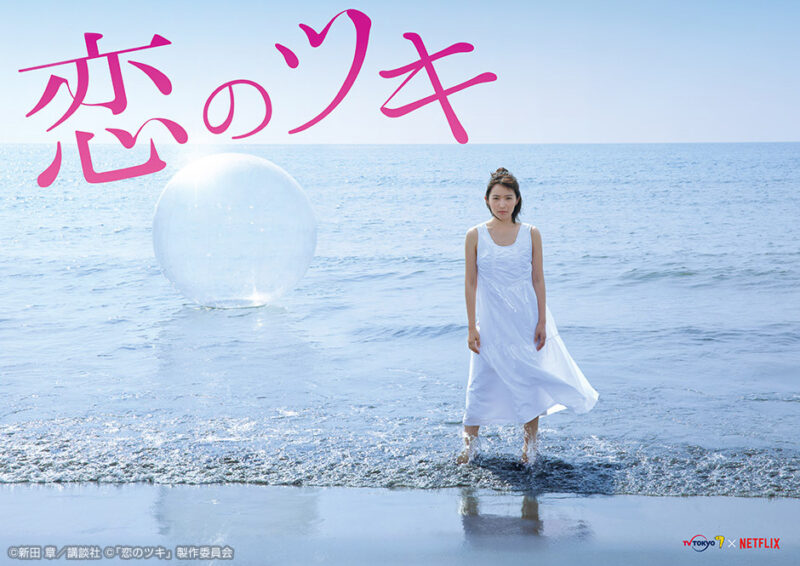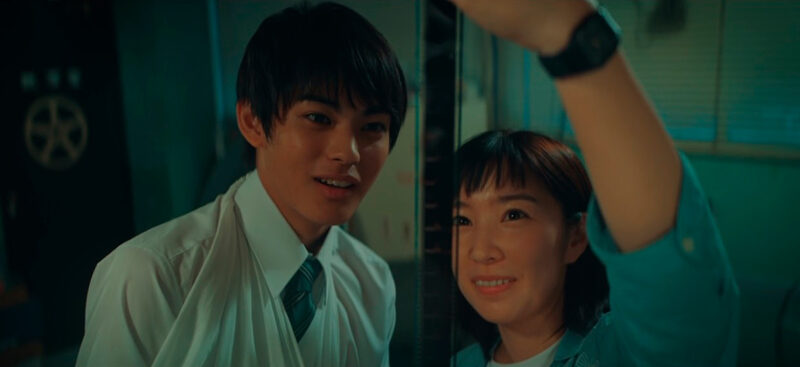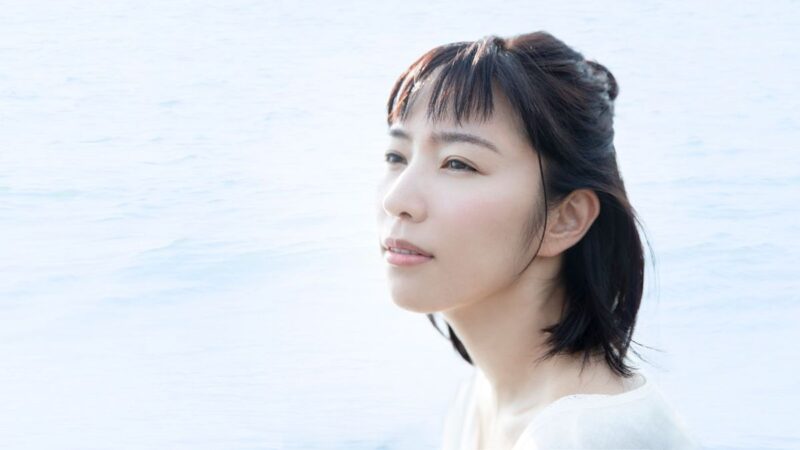
One day while she works at a movie theater, Wako sees the 15-year-old Yumeaki Iko, and gradually their affair sparks.
The story deals with a lot of heavy themes without focus on any of them for any length of time. Wako knows that her sexual relationship with Yumeaki makes her a sex offender. The series hints that this lends a little excitement to their dalliances. The story touches on the double standard that plays into sex offenses with minors. Men are seen as preying on young girls. Women are seen as desperate, depressed, and strange. While people think the women disgusting, they don’t label them as monsters as they do men. All of this is handled by cuts to news reports and gossip that swirls around Wako.
The central theme deals with Wako’s sexuality and her sense of having an expiration date. While I’ve encountered this idea in my research, watching a drama captured how emotional this can be for many women. Wako worries about losing her desirability as she enters her 30s, past the prime age of marriage in Japan. Yumeaki’s lack of concern for her age attracts her. With him, she doesn’t have to think about marriage and children. Love and Fortune firmly equates marriage with children.

The show has a lot of sex but not a lot of skin. Wako enjoys her sexuality and often takes the lead. Yet, she remains passive in many other aspects of her life, such as at work. She fantasizes about Yumeaki while with her boyfriend; although this leaves her feeling a bit guilty. She also masturbates to her fantasies. It’s not often you see this portrayal of female sexuality. Usually it is more from the male side of things and without the duplicity Wako shows. You don’t always see women enjoying sex as Wako does.
However, the show makes sure to show how the duplicity catches up to her. The final episodes focus on the distrust Wako builds up in her relationships and with Yumeaki. Lies and lack of communication poison her relationships and it builds over time. It poisons the sex she enjoys and drives her toward a breaking point.
Although the story is fiction, Love and Fortune brings together what I’ve researched into a more human package. Wako’s worry about her “expiration date” and her career and her desirability isn’t just a Japanese concern. I’ve seen it with American women as they age. The culture of youth places undue pressure on women. Of course, this is partially because of men’s desires. Wako’s boyfriend Fuuta captures the research I’ve also encountered. He’s a salaryman who often struggles to express himself directly. He also has an immature streak, always playing video games and not helping Wako with chores. But he isn’t a bad guy by any means. He’s loyal and forgiving. He’s also self-centered and dense. No matter how much I study Japanese media, the dense male irritates me.

Wako remains an interestingly complex character. She struggles with her affair and with her general sense of dissatisfaction with every day life. She doesn’t help Fuuta’s denseness. She fails to communicate her needs as much as he fails to notice those needs. This is a common problem with couples. She may annoy some viewers. She often backpeddles in her decisions and takes some time to come to a decision. But I found this realistic.
While fiction, Love and Fortune explores many concerns that remain in modern societies. It gives a human element to what researchers discover. As I watched the series, I found myself projecting my Christian sensibilities. I kept wondering why Wako, Fuuta, and the others felt so little guilt about their dalliances. I understand Japanese culture doesn’t view sex as sinful as we in the West often do. After all, the Bible is blunt: sex outside of marriage is sin (Hebrews 13:4; Corinthians 6: 18-20). Keeping sex out of the equation forces couples to not rely on physical attraction as the foundation of their relationships. Physical attraction is a foundation of sand at best. For most couples, it fades. The series touches on this as Wako worries about her aging compared to the 15-year-old Yumeaki. After all, Wako could’ve been his mother if, as she phrases it, she made a mistake in high school. But they also shared similar interests.
As I watched, my Christian beliefs kept coming to the forefront. Namely, sex needs to wait until marriage. It’s interesting how dramas can tug at your beliefs. Much of the drama happens because the characters can’t control their primal urges. Of course, if they had the story wouldn’t have been as engaging or explore the themes it did. Interestingly, I discovered that I looked down on the characters and felt disappointed in them. And this revealed how prideful my beliefs can be. I look down on male characters that can’t “keep it in their pants” until marriage. I am judgmental of them.
Sometimes how we engage with a story makes a new story. Love and Fortune kept me engage, not because of its story and themes, but because of how I notice myself reacting to the story. I analyzed my reactions as I watched, noticing how often I shook my head and called them idiots. It isn’t a flattering view of myself. It shows how prideful I am. We become so accustomed to our viewpoints that we remain unaware of them. It does us well to see ourselves for who we are as we watch a show or read a book. Once we see areas we dislike, we can work to change them. Yes, even dramas and anime can be a means of self improvement.
As for Love and Fortune, it touches on many themes but doesn’t dwell on any one of them in depth. The sex offender problem reappears often and provides Wako with some inner conflict. The series could’ve used a longer run time to spend more time on Wako’s unraveling, but for the most part, it handles everything well enough. Fuuta is a little too flat. As are most of the supporting cast. However, the show remained interesting and provided an emotional perspective to my research. This isn’t the type of show I normally watch, but trying something different can lead to interesting insights.




I wasn’t sure that he did “come back” or they were together again, but at very end she says “thank you” so I then assumed he returned to her. Maybe due to her old co-worker who also had a younger boyfriend, saying “if we “break up, then we break up” helped Wako in the long run. The key is Wako and Yumeaki’s shared movie making/watching passion which was the glue keeping them together. She needed to be on her own for awhile anyway to figure herself out, and it appears that she did just that.
Me too I don’t understand if they came back
I still have too many open questions? I don’t think the sex offender aspect was covered sufficiently. Where were Iko’s parents? I kept waiting for them to show up and send him to boarding school or something. He is a 10th grader and she has no more money, how did the theater get financed? Ill portrayed Iko as sex addict like trying to have sex when Wako sick in hospital. Iko at 15 became overly jealous and controlling and engaged in what I saw as punishment sex. Iko is gorgeous But Wako is 30 something and not on his level with beauty factor in looks, dress. Not shown her move or Iko. Fu and woman baby- when did that hat. Tish had baby-so? Sister pregnant-again. Too many open questions!
I also noticed the story left many loose ends and incongruencies. Unfortunately, many stories leave loose ends and don’t consider details like you point out.
There was a “few years” lapse, which you kind of have to fill in the blanks on your own. Its a drama so not every detail is going to be shown or explained.
Sorry i already made my review, but it seems that it was a short episodes! It was a happy ending for all of the characters, but i am more interested with Wako and Yumeaki!,……..She is on her thirties and he is on his tweenties, but regardless on their age they love each other so much…..I want to see them happily married. Is there new episodes coming in the future?
I haven’t seen anything about new episodes.
I wasn’t sure that he did “come back” or they were together again, but at very end she says “thank you” so I then assumed he returned to her. Maybe due to her old co-worker who also had a younger boyfriend, saying “if we “break up, then we break up” helped Wako in the long term. The key is Wako and Yumeaki’s shared movie making/watching passion which was the glue keeping them together. She needed to be on her own for awhile anyway to figure herself out, and it appears that she did just that.
I find this story interesting!….love and emotions between Wako and Yumeaki. He didn’t care about the gossips and embarrassment…. His jealousy was kind of cute. A lot of fears on Wako. ….she’s very passive!. Lack of communication with her boyfriend Fu and their sex life wasn’t that good either! Fu, just like to play games.. He was a nice guy, but he rely on Wako in so many things………sometimes our emotions will take us to the extent that we don’t even think if it’s right or wrong!…..Fuji Kanin, is a very handsome young man…….9/2/22
Emotions, when they are the primary means of acting, often lead us astray. Romance fiction often has emotions redeem themselves, but they rarely redeem themselves in reality. Perhaps that is one of the appeals of the romance genre too.
The self-assessment poses a fascinating social contrast. It seems to go right along with the “guilt vs. shame vs. fear” version of comparative cultural social control and mediation of behavior. The Western emphasis on conscience and moral obligation (guilt mediation) contrasts with the East Asian emphasis on maintaining a place in the group dynamic (shame mediation). I don’t often hear Americans objectively consider their own beliefs in that regard, since basing values in faith is a generally accepted social norm. Compare this to the Japanese honne (本音) versus tatemae (建前), the fear of public embarrassment, or of losing face (面子を失う). Considering Wako’s “expiration date”, “ai” (愛) versus “koi” (恋), marriage = children, news and gossip, and the reputation of a sex-offender is a likewise unexpectedly deep social introspection in that regard.
It’s interesting how patterns of thinking differ from East and West. Most Americans I know view the loss of face as immature. Ironically, they don’t see how their behavior falls into the same category, if in different ways. Lack of individualism, for example. risks “losing face” in an American sense. I find this oxymoron amusing.